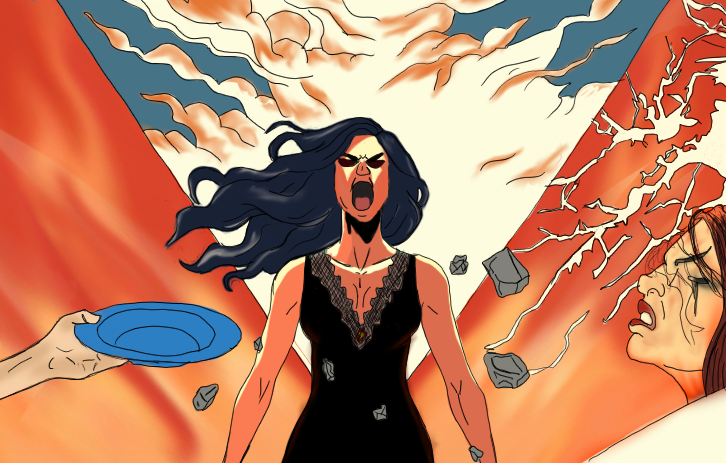Maybe I’m not always the problem. It’s hard to trust yourself when you’ve been taught that your thoughts and feelings are wrong your whole life. I’ve been told not to stand up for myself, that some fights aren’t “worth it.” I’m sick of “protecting my peace” when I’d rather protect myself — and you should be sick of it, too.
A couple of weeks ago, some guy cut me in line for an omelet at breakfast. The wait wasn’t even too long. This simple, seemingly unobjectionable action of cutting in front of me filled me with so much fury. Unlike him, I’d been waiting in this line for ten minutes. Why does he get to just cut in front of me? What gave him the right to think so little of me, or so much of himself, that cutting in front of me is OK?
It’s been hard-wired into my brain to make exceptions for other people, especially men. Not just my brain, but everyone who was assigned female at birth faces this struggle. Boys are socialized differently when they’re younger, and boys are pushed harder and encouraged to pursue their own interests more, while it’s OK for everyone else to be scared and fall behind.
The Journal of Applied Developmental Psychology conducted an experiment that showed parents pressuring their toddler sons to do more dangerous tasks on a playground while allowing their other children to quit earlier out of “overprotectiveness.” The cycle continues.
Men are expected to behave this way. While there are anomalies, society does its best to ensure very few slip through the cracks. So I rationalize — omelet guy probably just didn’t think I was in line. Maybe he thought I’d already ordered? But that’s not true. I know that, and he does too.
This isn’t just a “men” issue. Countless times I’ve been told to hold my tongue when someone acts deplorably, and countless times I’ve obeyed — and more often than not, it won’t be a man saying this to me. There’s a blatant dichotomy between “good” and “bad” women throughout history, with “bad” women being promiscuous and difficult to control, and good women being chaste and submissive.
A few weeks ago, I guess I was blocking a shelf in an Office Depot, and a man put his hands on me and physically moved me aside. He might’ve said excuse me, but I didn’t hear it. And I sure didn’t say yes to being moved so nonchalantly, like I was just something in the way like a chair blocking a doorway.
I turned to a friend I was sitting next to, filled with this same fury, the fury that arises every time a man just thinks it’s OK to forget I’m just as much a person as he. And she told me not to say anything, not to start a fight or cause a scene. “We have a test tomorrow,” she said. He probably said something out of politeness, and no she didn’t hear it either, but he probably did. Herein lies the issue: a man wouldn’t physically move another in that way, and if he did, he certainly wouldn’t have gotten off scot-free.
Anger has been tethered to the idea of men and their masculinity, and in doing so, severed from oppressed groups such as women, especially women of color like myself. How awfully convenient is it for men that anger, the tool most useful to free ourselves from oppression, has been labeled as taboo?
When we do get angry, allow our tops to blow off and finally let steam out, it’ll be during a seemingly innocuous situation like being cut in line or moved aside. Like chill, it’s not a big deal. Is it really worth the fight? I mean, that’s life. No, it’s not. That’s subjugation, and if you don’t speak up, you give in.
No, I didn’t stand up for myself at breakfast and tell this man that there’s a line. I didn’t tell that other guy he couldn’t just move me aside. I figured they’d say something like “I’m in a rush” or “Jeez, it’s not a big deal.” I let it go, and I figured I’d protect my peace and not cause a scene — whatever that means. But, in doing so, I taught him (and myself) that his actions were OK. I made space for him to treat me like less than, so I made space for him to continue doing so.
Sure, a few weeks ago he just cut me in line. Then a few days later he just moved me aside. But what if tomorrow he’s speaking over me in class? What if the day after he’s taking credit for my ideas? What if he gets chosen over me for a job because his passion is considered ambition while mine is considered greed? What if !?
It’s not fair that I have to be the person who re-educates men and teaches them basic respect. I’d rather tell that man to go to the back of the line than convince myself that I’m the one in the wrong, or that his actions were OK.
I still need to relearn a lot of things too, like that there’s no such thing as “making a scene” or that I should stop rationalizing bad behavior in my head. I need to learn not to be ashamed of my fury, and that standing up for myself is always worth it. I’m getting that omelet, I’m telling that man off and seriously, you should too.







